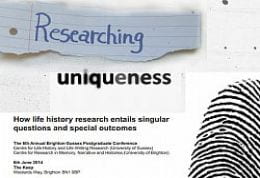6th Jun 2014 11:00am-4:00pm
The Keep
The 6th annual Brighton-Sussex postgraduate conference
Co-organised by the Centre for Life History and Life Writing Research (University of Sussex) and the Centre for Research in Memory, Narrative and Histories (University of Brighton)
Keynote Speakers
DR SIMON THOMPSON: “Everyone knows but do they understand?” Distinctive encounters and challenging confrontations with the life histories of UK education
How can narrative inquiry and personal narratives be used to explore contemporary education? This presentation shows how through two research projects which demonstrate the rich variety of methods possible. The first involves biographies and interviews with history teachers; the second, Mass Observation diaries about people’s experiences of education. In both forms of life history data, I argue that we can perceive fascinating challenges to dominant discourses on the curriculum, schools, teachers and pupils which reveal the politics of education in new light.
Dr Simon Thompson is a Senior Lecturer in Education at the University of Sussex where he directs the Initial Teacher Education programme. A specialist in history education, he has worked extensively with schools and professional development of teachers, receiving a Teaching Excellence Award in 2006.
DR PHILIPPA LYON: Drawing, life, story
Can we use drawing in our ‘research’, and if so, how? To what extent do we understand it in relation to the uniqueness of the individual creator as opposed to the historical, social and cultural contexts in which the drawing might be placed and understood? Using examples that include work by professional artists, this session will offer initial and exploratory thoughts on whether drawing can be viewed as a ‘unique’ resource or a tool for life history.
Dr Philippa Lyon is a Research Fellow in the Faculty of Arts, University of Brighton. She researches drawing as an educational tool and a professional practice, working particularly across the disciplines of craft and medicine.
Call for papers
Life history methods across disciplines offer special challenges but they also offer uniquely rich results. This conference will focus in particular on the tension between analysing the individual’s unique experience and understanding the social or collective contexts which define it. It will also more broadly address the complexity and variety of its methods as it is used across disciplines, from qualitative social sciences to literary auto/biographical studies, to oral history, the documentary arts and narrative psychology. It will consider the experience of the researcher as we find ourselves steered in unique investigative directions, thus shaping the way knowledge develops in particular ways. It will acknowledge how researchers working in this field are more likely to encounter and tackle challenging, underexplored or unexpected themes not always present in mainstream narratives or ‘traditional’ sources.
We invite postgraduate participants to present at this conference their contributions on why it was pivotal to prioritise the life history methodology in answering initial research questions and how this approach subsequently shaped and impacted their research and findings.


Leave a Reply